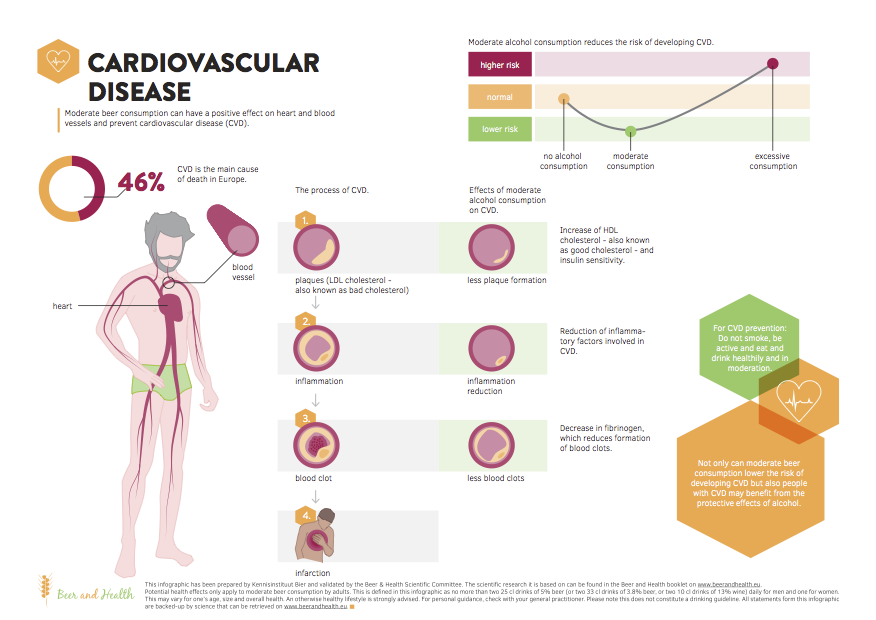Moderate alcohol consumption is associated with a lower risk of developing cardiovascular disease. But what if you already have cardiovascular disease? A recent meta-analysis1 still finds a decreased risk of mortality and cardiovascular events for those drinking moderately compared to current non-drinkers. Up to 10 drinks a week might have protective effects and there is no elevated risk with heavy alcohol consumption.
What is already known? The most recent meta-analysis towards this topic is published in 2010.2 The researchers looked at patients with myocardial infarction, angina, or stroke, and found the lowest risk of mortality for those drinking around 7-8 grams of alcohol a day compared to non-drinkers.
What does this study add? This meta-analysis combines 12 previously published observational studies with new data of three large cohort studies in the UK (UK Biobank, Health Survey for England, and the Scottish Health Survey).
Lower risk of mortality
The analysis shows a J-shaped association between alcohol consumption and mortality in patients with cardiovascular disease. The protective effect peaks at 7 to 8 grams a day (which is a little less than one drink), but the protective association is still significant up to five to six drinks a day. However, the associations seem to differ per disease. The protective association is more pronounced in patients with previous myocardial infarction than angina or stroke.
What is also important to note is that most of the included studies do not separate former drinkers from lifetime abstainers. Patients might have stopped drinking due to health reasons, which makes them unfit for the non-drinking control group. In the few included studies that do separate the two, the association is considerably weakened and sometimes even disappears completely.
Second cardiovascular event
Four included studies also look at the effect of alcohol on the risk of a possible second cardiovascular event. Data show a lower risk for moderate alcohol consumption up to 1,5 drinks a day (15 grams). However, the association becomes non-significant when former drinkers are excluded.
Recommendation
Based on the results, the authors conclude that for secondary prevention of cardiovascular disease, current drinkers may not need to stop drinking. But should be informed that lower levels of consumption – up to 10 drinks a week – may be associated with reduced risk. “However, non-drinking patients should not be encouraged to take up light drinking because of well-known adverse effects on other health outcomes, such as cancers”, added the authors.
Strengths
- Many studies included
- Results are in line with previous research
- Additional analysis with studies excluding former drinkers
Limitations
- Observational research – cannot prove causality
- Many studies do not separate former drinkers from non-drinkers
- Not all studies adjust for medication use
References
- Ding, C., O’Neill, D., Bell, S., Stamatakis, E., & Britton, A. (2021). Association of alcohol consumption with morbidity and mortality in patients with cardiovascular disease: original data and meta-analysis of 48423 men and women. BMC Medicine.
- Costanzo, S., Di Castelnuovo, A., Donati, M. B., Iacoviello, L., & de Gaetano, G. (2010). Alcohol consumption and mortality in patients with cardiovascular disease: a meta-analysis. Journal of the American College of Cardiology, 55(13), 1339-1347.


